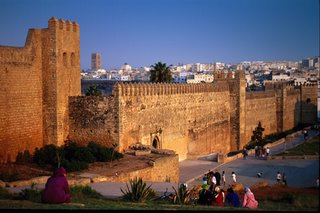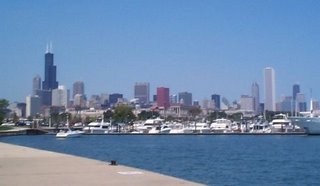Anticipation/Urbanophilia
Let's begin: I'm about to undertake one of my most favorite activities, which is violently uprooting myself from my current abode and dropping into a completely alien environment with absolutely no knowledge of the language, people, or culture of said locus. I am certainly one of those "grass is greener" people, never satisified with where I am and always looking forward to the next move. Perhaps it is the anthropologist in me, a desire to be a true participant in my observations, but there really isn't any other way to travel in my opinion. And strangely enough, I feel more at home in these places than I do at my "home." I also have an indescribable affinity for the "urban." Perhaps this is due in part to my rural upbrining; maybe I will always inhabit the role of the country bumpkin, eternally awed by the lure of the city. Incidentally, for any "urbanophile" like myself, I strongly suggest reading Italo Calvino's Invisible Cities (http://www.amazon.com/gp/product/0156453800/sr=1-1/qid=1155415428/ref=pd_bbs_1/002-0971663-3076816?ie=UTF8&s=books), which in my opinion cuts to the core of the perspective an outsider brings to the cities he or she experiences. This time, my destination is the southeast coast of the Korean peninsula, a town named Cheonsang, just outside of Ulsan: 
I would like to apologize in advance for the inevitable comparisons I will draw in this and future posts between Ulsan/Cheonsang and other cities I have lived in. Apologies are due because I feel that each city has it's own personality, it's own raison d'etre even, and to compare cities only serves to reveal one's own personal (cultural) biases. Each city also has it's own legibility, to shamelessly borrow a phrase from James C. Scott; I revel in those first few weeks after touching down when you begin to understand how to get from point A to point B... and then the following months when you discover that it's much quicker to take a shortcut via route C. Perhaps the most illegible city I have ever lived in was Rabat, Morocco:
The labyrinth of streets, sidestreets and alleyways in the medieval-era medina confused and delighted me. I could be almost certain that by taking a particular route, I would end up where I wanted to be, and then be pleasantly surprised to find myself in an area I'd never seen before. Rabat moves at it's own speed; there is no obligation to rush and every corner invites one to linger. Of course, to its residents, Rabat is easily navigable. But to the outsider, such as I was, it is a happy mess full of infinite diversions (and yes, I realize the Orientalist implications of this statement). Opposed to Rabat is Prague, Czech Republic, probably the most legible city I've ever lived in:

Within two weeks of arrival, I knew how to get to any location in Prague. Even though it is a city of 1.2 million, Prague seems tiny. One will inevitably run into the same people again and again in the oddest of places. This is part of Prague's mystery, a city of unbelieveable, "storybook" beauty as well as the most painful loneliness one can ever experience. It is no wonder that this is Kafka's birthplace; seriously, "The Trial" makes absolute sense if you've spent a good amount of time here. Sometimes it seemed to me as if nothing ever remained the same there, but I eventually learned that there was one constant: I knew that no matter what, someone, somewhere would be a complete asshole to me each and every day. Oddly enough, I found it endearing by the end of my stay. Both Rabat and Prague are miniscule when compared to Chicago:

America's "Second City," and with all apologies to my beloved Chi-Town, there really is an inferiority complex in relation to NYC, from then stone lions outside the Art Institute to the "Russian Tea Time" on Adams St. What I love about Chicago (besides the architecure and the food) is that people there are actually very nice to one another. For any American urbanite, it is easy to find your way around Chicago; it's layout makes sense to us, basically a grid system with clearly defined North, South, East and West sides.
How long will it take me to discover Ulsan's legibility? We'll see. All I know is that I will enjoy the process.

I would like to apologize in advance for the inevitable comparisons I will draw in this and future posts between Ulsan/Cheonsang and other cities I have lived in. Apologies are due because I feel that each city has it's own personality, it's own raison d'etre even, and to compare cities only serves to reveal one's own personal (cultural) biases. Each city also has it's own legibility, to shamelessly borrow a phrase from James C. Scott; I revel in those first few weeks after touching down when you begin to understand how to get from point A to point B... and then the following months when you discover that it's much quicker to take a shortcut via route C. Perhaps the most illegible city I have ever lived in was Rabat, Morocco:

The labyrinth of streets, sidestreets and alleyways in the medieval-era medina confused and delighted me. I could be almost certain that by taking a particular route, I would end up where I wanted to be, and then be pleasantly surprised to find myself in an area I'd never seen before. Rabat moves at it's own speed; there is no obligation to rush and every corner invites one to linger. Of course, to its residents, Rabat is easily navigable. But to the outsider, such as I was, it is a happy mess full of infinite diversions (and yes, I realize the Orientalist implications of this statement). Opposed to Rabat is Prague, Czech Republic, probably the most legible city I've ever lived in:

Within two weeks of arrival, I knew how to get to any location in Prague. Even though it is a city of 1.2 million, Prague seems tiny. One will inevitably run into the same people again and again in the oddest of places. This is part of Prague's mystery, a city of unbelieveable, "storybook" beauty as well as the most painful loneliness one can ever experience. It is no wonder that this is Kafka's birthplace; seriously, "The Trial" makes absolute sense if you've spent a good amount of time here. Sometimes it seemed to me as if nothing ever remained the same there, but I eventually learned that there was one constant: I knew that no matter what, someone, somewhere would be a complete asshole to me each and every day. Oddly enough, I found it endearing by the end of my stay. Both Rabat and Prague are miniscule when compared to Chicago:

America's "Second City," and with all apologies to my beloved Chi-Town, there really is an inferiority complex in relation to NYC, from then stone lions outside the Art Institute to the "Russian Tea Time" on Adams St. What I love about Chicago (besides the architecure and the food) is that people there are actually very nice to one another. For any American urbanite, it is easy to find your way around Chicago; it's layout makes sense to us, basically a grid system with clearly defined North, South, East and West sides.
How long will it take me to discover Ulsan's legibility? We'll see. All I know is that I will enjoy the process.

0 Comments:
Post a Comment
<< Home